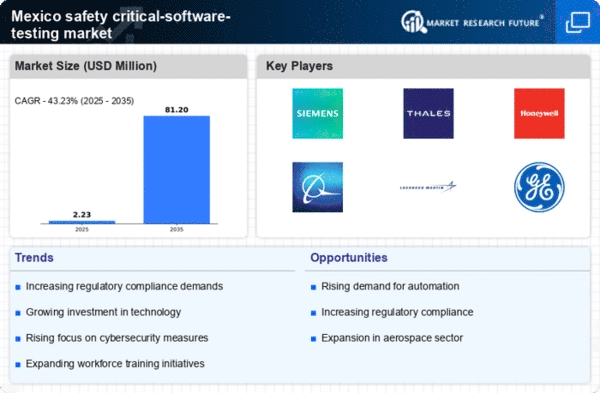Emergence of Smart Cities and IoT Solutions
The emergence of smart cities in Mexico is significantly impacting the safety critical-software-testing market. As urban areas adopt Internet of Things (IoT) technologies to enhance efficiency and safety, the complexity of software systems increases. This complexity necessitates comprehensive testing to ensure that these systems function reliably under various conditions. The smart city initiative in Mexico City, for instance, aims to integrate smart technologies across transportation, energy, and public safety sectors. With an estimated investment of $1 billion in smart city projects, the demand for safety critical-software-testing market solutions is expected to rise. Ensuring the safety and reliability of IoT applications is crucial for the successful implementation of smart city initiatives.
Healthcare Sector's Technological Advancements
The healthcare industry in Mexico is undergoing significant technological advancements, which in turn fuels the safety critical-software-testing market. As medical devices and health information systems become increasingly reliant on software, the need for stringent testing protocols is critical. The market for medical devices in Mexico is expected to reach $10 billion by 2026, highlighting the potential for growth in safety critical-software-testing services. Ensuring the reliability and safety of software in healthcare applications is essential to prevent catastrophic failures that could jeopardize patient safety. Consequently, healthcare providers are investing in safety critical-software-testing market solutions to comply with regulations and enhance the quality of care.
Increasing Demand for Safety in Transportation
The transportation sector in Mexico is experiencing a heightened demand for safety critical-software-testing market solutions. With the rise in vehicle automation and the implementation of advanced driver-assistance systems (ADAS), the need for rigorous software testing has become paramount. According to recent data, the automotive industry in Mexico is projected to grow by 5.5% annually, necessitating robust testing protocols to ensure safety and compliance. This growth drives investments in safety critical-software-testing market services, as manufacturers seek to mitigate risks associated with software failures that could lead to accidents. The emphasis on safety in transportation not only enhances consumer confidence but also aligns with regulatory requirements, further propelling the demand for comprehensive testing solutions.
Rising Cybersecurity Threats in Critical Systems
The escalating cybersecurity threats faced by critical systems in Mexico are driving the safety critical-software-testing market. As industries such as energy, transportation, and healthcare increasingly rely on interconnected systems, the potential for cyberattacks poses significant risks. Reports indicate that cyber incidents in Mexico have surged by 30% over the past year, prompting organizations to prioritize the security of their software. This trend necessitates the implementation of rigorous testing methodologies to identify vulnerabilities and ensure the integrity of safety-critical applications. The safety critical-software-testing market is thus positioned to grow as companies seek to fortify their defenses against cyber threats, ensuring compliance with emerging cybersecurity regulations.
Government Initiatives for Infrastructure Development
Government initiatives aimed at infrastructure development in Mexico are contributing to the growth of the safety critical-software-testing market. As the country invests in modernizing its infrastructure, including transportation and energy systems, the demand for reliable software solutions becomes increasingly critical. The Mexican government has allocated approximately $25 billion for infrastructure projects over the next five years, which includes investments in smart technologies that require extensive software testing. This influx of funding is likely to enhance the safety critical-software-testing market, as stakeholders seek to ensure that new systems meet safety standards and regulatory requirements, thereby minimizing risks associated with software failures.
















